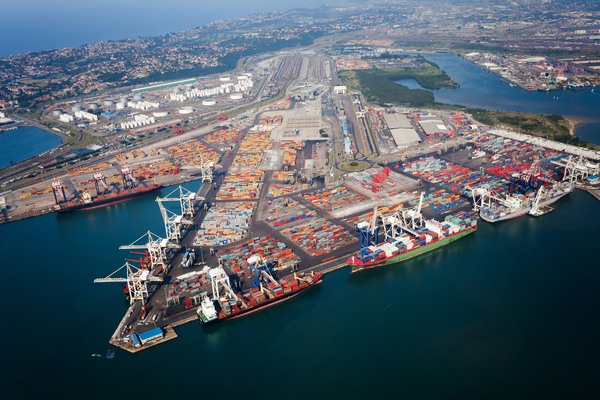Europe & Africa Market Update 24 Apr 2024
Bunker benchmarks have moved in mixed directions, and bad weather may impact bunkering in Gibraltar tomorrow.
 PHOTO: Durban port at sunrise. Getty Images
PHOTO: Durban port at sunrise. Getty Images
Changes on the day, to 09.00 GMT today:
- VLSFO prices up in Rotterdam ($3/mt), and down in Durban ($19/mt) and Gibraltar ($2/mt)
- LSMGO prices up in Rotterdam and Gibraltar ($3/mt), and down in Durban ($9/mt)
- HSFO prices up in Rotterdam ($2/mt), and unchanged in Gibraltar
VLSFO and LSMGO prices in Durban have resisted Brent’s upward movement and declined in the past day. One lower-priced VLSFO stem fixed at $710/mt in Durban and a LSMGO fixed at $976/mt have exerted downward pressure on the benchmarks.
Availability of VLSFO and LSMGO is good for non-prompt delivery in Durban, with a trader recommending lead times of 7-10 days for both bunker fuel grades. VLSFO availability is also good in nearby Richards Bay, where lead times are similar to those in Durban.
Rotterdam’s LSMGO gain has been supported by a higher-priced LSMGO stem booked for prompt delivery. Lead times of 3-5 days are recommended for LSMGO, 4-5 days for VLSFO and 4-6 days for HSFO in Rotterdam.
Wind gusts ranging between 12-23 knots are forecast to hit Gibraltar from tomorrow onwards, which could delay bunker operations until Saturday. Winds at the higher end of that range can pose problems to bunker deliveries by barge. Nine vessels are waiting to receive bunkers in Gibraltar today, unchanged from yesterday, a source said.
Brent
The front-month ICE Brent contract moved $0.73/bbl higher on the day, to trade at $88.14/bbl at 09.00 GMT.
Upward pressure:
Brent futures extended gains amid growing concerns about an escalation of geopolitical tensions in the Middle East.
“The possibility of further escalation [of tensions] in Eastern Europe and the Middle East remains a key factor driving upside risks in the oil market,” SPI Asset Management’s managing partner Stephen Innes said.
The US House of Representatives voted in favour of a foreign aid bill for Ukraine and Israel. The bill also includes a provision to broaden the current sanctions against Iranian oil.
This bill, which will be passed onto the US Senate and presented to President Joe Biden, “provides for US sanctions on foreign ports, vessel owners and operators, and entities that “knowingly” engage in the transportation, trade or refining of Iranian oil,” Vandana Hari, founder and market analyst at VANDA Insights said.
Brent futures also gained after the American Petroleum Institute (API) reported a decline in US crude stocks. Commercial crude inventories in the US declined by 3.23 million bbls in the week ended 19 April, according to the API.
A decline in US crude stocks indicates that oil demand is improving in the world’s top oil-consuming nation.
Downward pressure:
Downside risk factors acting on oil prices include the possibility of an increase in supply in the global oil market led by non-OPEC producers like the US, with its shale producers continuously ramping up drilling efficiency, analysts said.
Internal conflicts within the OPEC+ coalition could also prompt certain members to release their spare capacities, they added.
“Tensions within the [OPEC+] cartel persist, leading to voluntary cuts by certain members,” Innes said. “The UAE has expressed eagerness to ramp up production. The unity of the cartel largely depends on Saudi Arabia's willingness to continue shouldering a significant portion of the cuts,” he added.
By Manjula Nair and Aparupa Mazumder
Please get in touch with comments or additional info to news@engine.online

Contact our Experts
With 50+ traders in 12 offices around the world, our team is available 24/7 to support you in your energy procurement needs.





